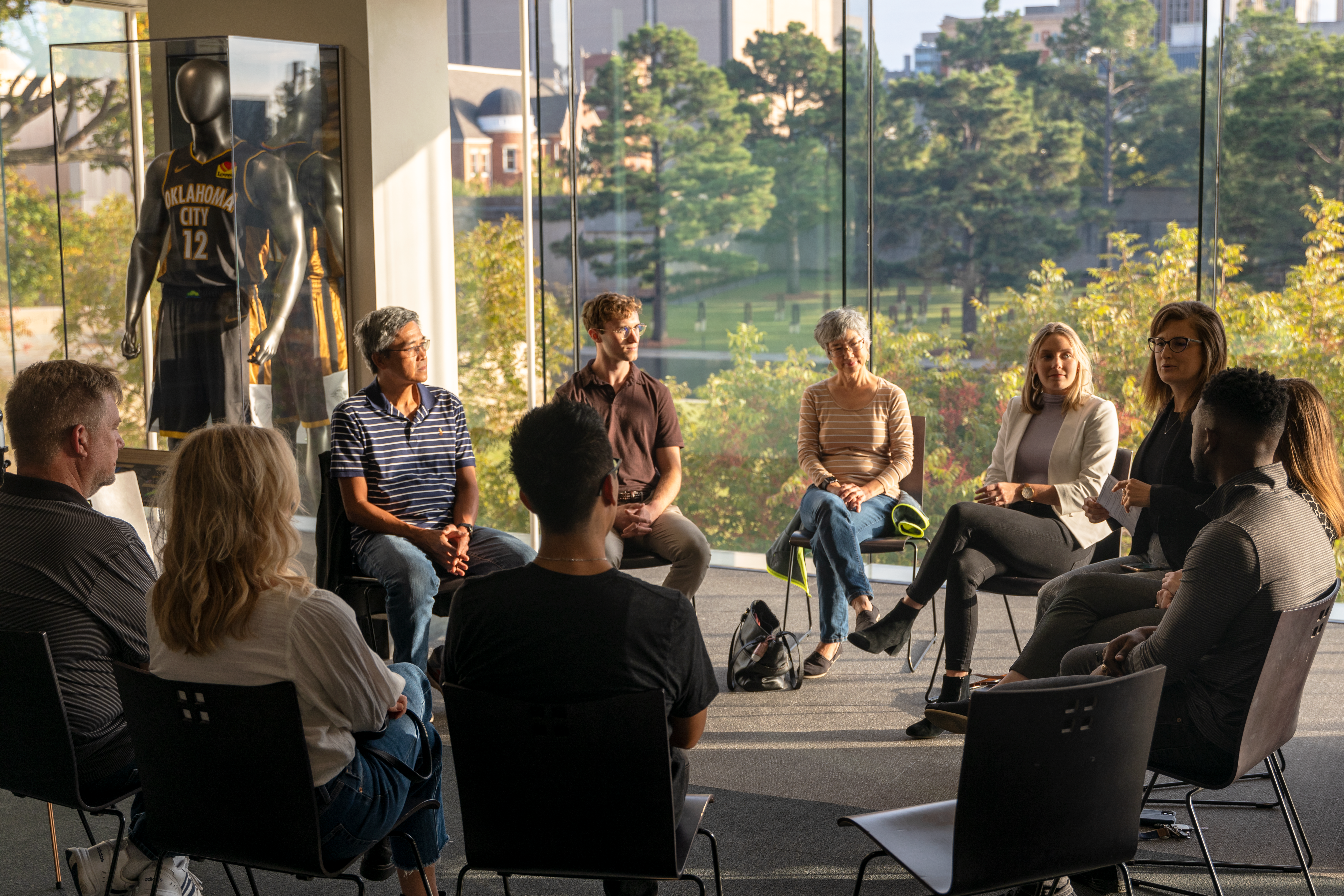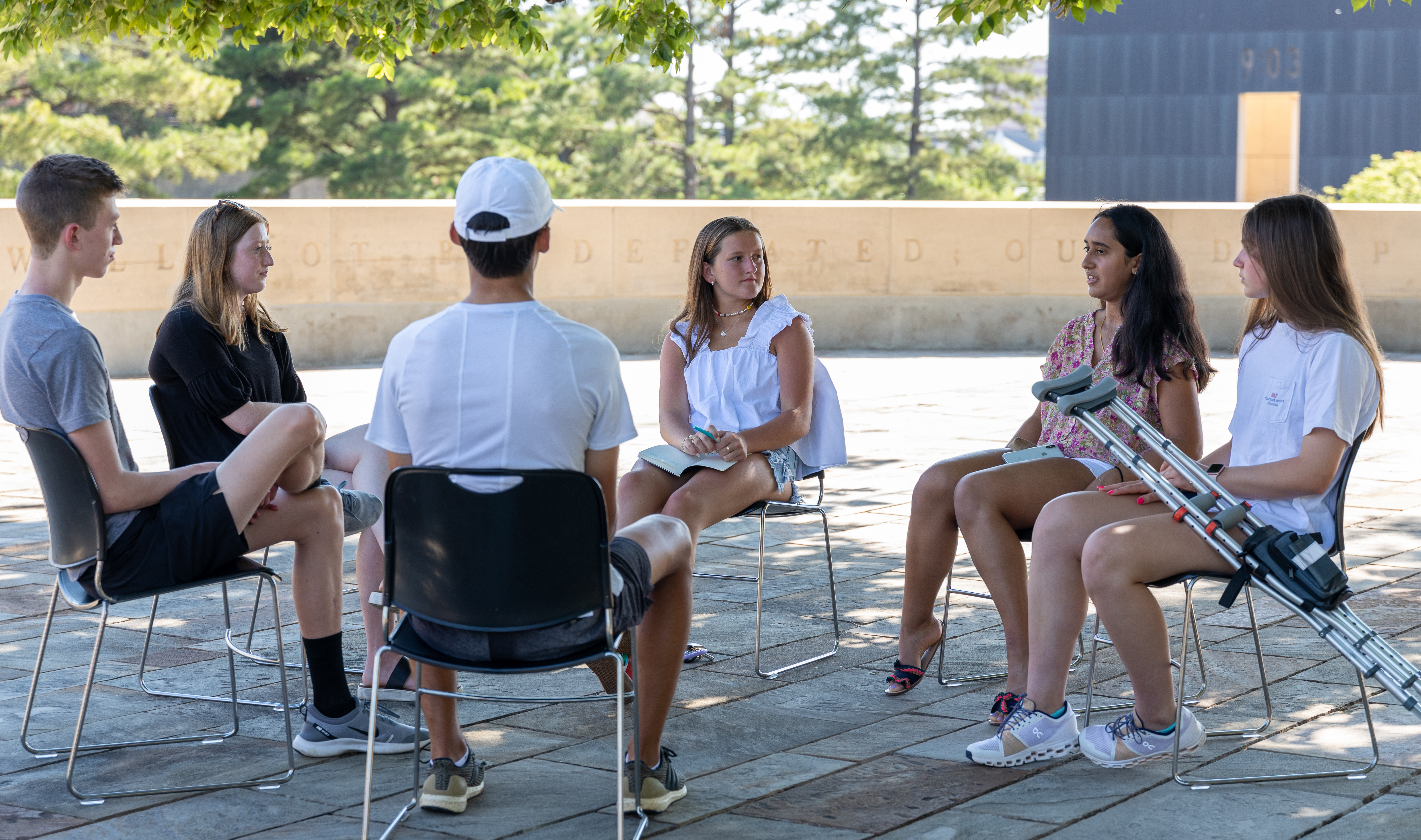Better Conversations


Oklahoma City, United States
The Action
Better Conversations is a project by the Oklahoma City National Memorial & Museum, which was established in remembrance of the 168 people killed when an American domestic terrorist bombed the Alfred P. Murrah Federal Building on April 19, 1995. In 2020, the 25th anniversary of the attack, the museum used seed money from the Bank of America to launch Better Conversations. The project aims to reinforce the belief that people with different perspectives can have civil discussions and disagree without resorting to violence. This approach is intended to combat extremism and build community in an increasingly polarized world.
The project teaches students and adults how to resolve conflicts peacefully by looking at how conversations work—listening carefully, changing the questions we ask and how we ask them. Better Conversations hosts in-person and Zoom conversations, provides facilitator trainings to prepare people to lead their own groups, and provides free resources like question prompts and ground rules for respectful communication. The project also works with psychologists and communications experts to publish parent and educator guides for having difficult, honest, age-appropriate discussions with children on subjects from traumatic national events to the importance of nonviolence.
Democracy Challenge
When the project launched in 2020, Oklahoma City was grappling with many of the same problems as the rest of the United States. Disinformation swirled around the coronavirus pandemic and the 2020 elections, and racial tensions ran high in the wake of George Floyd’s murder by police in Minneapolis. During one period of unrest, the museum—a monument to tolerance—was defaced.
The goal of Better Conversations is to teach people to engage respectfully and empathetically, especially when that is hard. Though the project cannot reach everyone, it aims to change the world one conversation at a time. See below for a short documentary on the Better Conversations project.
How It Works & How They Did It
In 2019, museum staff started thinking about how they could honor the victims on the 25th anniversary of the attack, making sure that the programming helped prevent such a tragedy from happening again.
The museum’s executive director, Kari Watkins, reached out to fellow Oklahoman Krista Tippet, the founder and editor in chief of the National Public Radio On Being project and podcast. Together, they wanted to put Tippet’s methodology and philosophy into practice at the community level.
Better Conversations has six grounding virtues: words that matter, hospitality, humility, patience, generous listening, and adventurous civility. These terms are defined at the start of each conversation, and all participants must agree to abide by them before the first topic is introduced. Participants—usually eight to 16 people—gather in chairs arranged in a circle (or on an online platform), and the facilitator provides light-touch guidance throughout the conversation. Facilitators are trained to encourage all to speak and to diffuse tense situations by recognizing body language and nonverbal cues. This creates a safe space where every member of the group feels included, enabling them to unpack difficult topics in a sensitive and nuanced way.
The project’s staff is small (three people), but as of February 2022 160 facilitators had been trained and roughly 8,000 people had participated directly in the museum’s programming.

How’s It Going?
Though Better Conversations started as an in-person project, the pandemic forced the museum to adapt to an online format. Despite the learning curve as they embraced new technology, the shift to online meetings benefitted the project by extending its reach.
Museum-led conversations have included a wide range of topics, from unpacking the January 6 attack on the US Capitol to responsibly engaging with social media. Guest speakers have included a diversity of perspectives, too, including an FBI counterterrorism specialist and professional athletes who weighed in on how to foster respect between people with opposing views.
In addition to hosting regular monthly conversations, the museum also trains facilitators to lead discussions independently. Facilitators have led groups in churches, community centers, and even coffee shops. Conversations can be one-off events or recurring meetings, and the flexibility of the model allows relationships to evolve organically to meet each group’s unique needs. To reach more young people, who have proven particularly receptive to this model, the museum recently began training a cohort of 100 geography and history teachers to lead conversations in their classrooms.
The project works hard to remain explicitly apolitical, though this can be challenging in a context where everything from elections to pandemics has been politicized and misinformation runs rampant. When people cannot agree on the facts of a situation, nuanced discussions about differences of opinion become much harder. Facilitators of Better Conversations, however, have found that those who agree to participate almost always remain civil and respectful, regardless of their political ideology. While there are differences of opinion—sometimes strong ones—when participants agree on the grounding virtues, conversations are extremely productive. Even if people come away from them with disagreements, those conflicts are not existential. By training people to confront differences with compassion, these kinds of discussions discourage zero-sum thinking, which can lessen polarization and conflict in the broader community.
Participation in these conversations is voluntary and those who attend are likely to be more open-minded to begin with. However, while the format might not be an appropriate way to reach everyone or to address every issue, it can be very effective for people who are willing to engage with humility and empathy on issues where reasonable people can hold differences of opinion. The goal of the project is not necessarily to convert extremists, but to create an environment and community ethos that discourages people from embracing those views in the first place.

The museum tells a cautionary tale of the consequences of radicalization, but more important than that, it is a testament to the fact that the vast majority of Oklahoma City’s people came together after the tragedy and rejected what the bomber stood for. The Better Conversations project has repeatedly demonstrated the capacity of people to confront difference with curiosity instead of hostility, and by doing that, they illuminate a path forward for all who strive to build a better world.
Considerations
- People are unpredictable and facilitators should be trained to respond to a variety of situations and emotional responses. The Better Conversations website offers resources for facilitators that include guidance for refocusing the group when things get off track. Trainings include how to diffuse tensions when conversations get heated, how to respond when someone cries, how to encourage quieter participants to contribute, and how to gently redirect the conversation when one individual begins to dominate.
- Projects based in cities should consider doing outreach to rural areas because including them can increase the diversity of a group.
Point of Contact
Kari F. Watkins
Executive Director
(405) 235-3168
[email protected]
Who Else Is Trying This?
- Raleigh, North Carolina, US: Courageous Community Conversations: In August of 2021, Shaw University in Raleigh hosted a series of virtual listening sessions on race, racism, and social equity called Courageous Community Conversations.
- New York City, US: Difficult Conversations Lab: The Difficult Conversations Lab studied polarizing moral conflicts to see whether and how dialogue can succeed as a tool for reducing tension between opponents on highly politicized issues such as abortion and gun control. The lab tracks the participants emotional, behavioral, and cognitive experiences to see how we can have better conversations in the future.